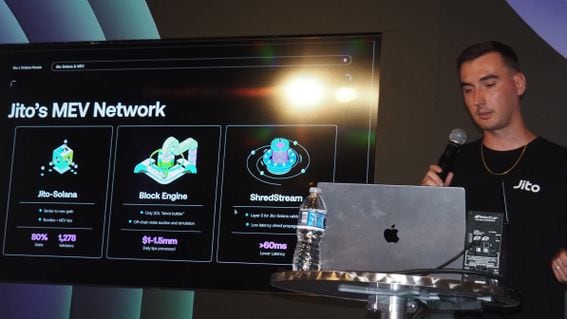
Jito Token Holders Set for Earnings Under New TipRouter Plan
A significant change to Jito's economic framework is in progress, promising payouts for token holders.
Investors in Jito’s JTO token may soon receive additional earnings as part of a redesign aimed at improving the Solana protocol’s economic setup.
Billions in crypto already traverse the network established by Jito Labs, which optimizes Solana transactions. In doing so, profit-driven bots have spent substantial funds in SOL to prioritize transactions beneficial to their operations.
“A new structure named TipRouter is being introduced, allowing a broader array of node operators to manage the distribution of Jito’s $15 million in tips every few days,” said Brian Smith from Jito Foundation.
Node operators will not only help in consensus but will also benefit financially, alongside JTO holders who stake their tokens with them, given that the upcoming governance proposal, JTO-10, is sanctioned.
The proposed system relies on recent strategic moves by Jito, including the establishment of a restaking network for Solana and the incorporation of an innovative governance model known as futarchy.
In this model, JTO holders participate in decision-making, with their influence proportional to the number of tokens they possess. This governance structure has not previously provided direct economic benefits, but that could change if the initial stages of JTO-10 are successfully navigated through Jito’s conventional DAO and the futarchy-based framework.
Interest in the MetaDAO has increased uniquely among Solana’s decentralized governance enthusiasts, although its complexity has limited broader participation. Jito is currently the most prominent participant, and substantial proposals like this could stimulate greater involvement with the futarchy concept.
Smith expressed optimism regarding the utility of these networks, arguing that they could demonstrate real-world economic potential and that stakeholders are eager to invest in their functionality. However, certain critical elements, such as a proposed slashing mechanism to penalize dishonest node operators, may not be available at launch, potentially affecting economic security.
The introduction of slashing is essential for the economic integrity of the broader restaking initiative, a fundamental component recognized by leading projects in the crypto space, including EigenLayer.
In conclusion, the upcoming TipRouter aims to establish a balanced financial ecosystem for Jito’s $3.6 million annual tips stream, benefiting both node operators and their supporters, provided that all requisite structures are fully operational.


